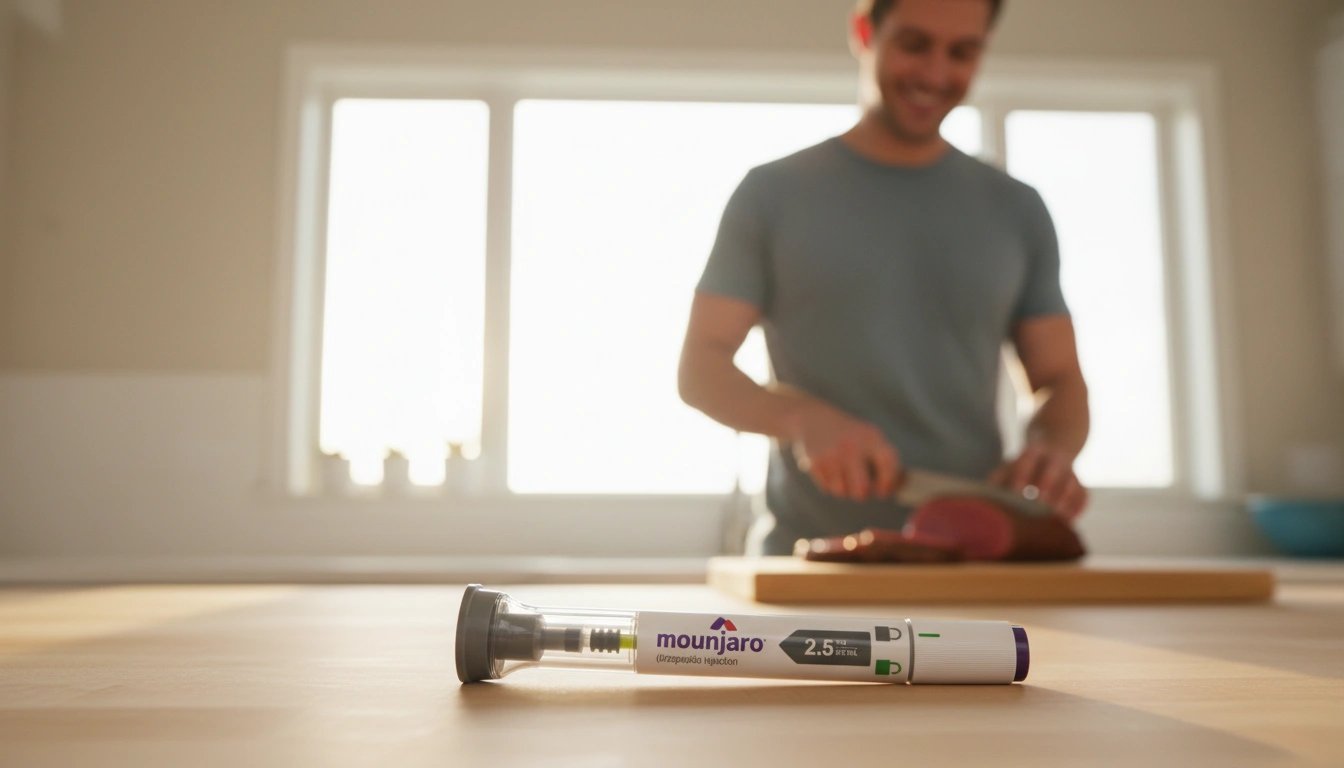How to Maintain Weight Loss After Stopping Mounjaro

Introduction
The journey to achieve and maintain weight loss can often feel like navigating a complex maze filled with challenges and uncertainties. Many individuals find that medications like Mounjaro (tirzepatide) can significantly aid in shedding pounds, but what happens when the time comes to stop using them? Research indicates that a substantial percentage of those who discontinue Mounjaro may regain a significant amount of weight, often as much as 14% of what they lost. This raises an essential question: how can we effectively maintain weight loss after stopping Mounjaro?
In this blog post, we will explore various strategies and lifestyle adjustments that can help in maintaining weight loss after discontinuing Mounjaro. We will look at the physiological changes that occur when the medication is stopped, the importance of sustainable dietary habits, the role of physical activity, and the psychological aspects of weight management. By the end of this post, you will have a clearer understanding of the steps you can take to continue your weight loss journey, even without Mounjaro.
Weight loss is not merely about shedding pounds; it’s about achieving a healthier lifestyle that can be maintained over the long term. For many, medications like Mounjaro offer a helping hand in initiating this transformation. However, the question of sustainability looms large when the medication is no longer in use.
As we delve into this topic, we will discuss the mechanisms by which Mounjaro operates, the hormonal shifts that occur after stopping treatment, and how to combat the potential for weight regain. We will also touch upon the importance of individualized approaches to weight management, aligning perfectly with our philosophy at TrimRx—where we emphasize personalized, medically supervised care for sustainable results.
Our discussion will cover:
- Understanding how Mounjaro works and its effects on the body.
- The physiological changes that occur after stopping Mounjaro.
- Practical dietary strategies to support weight maintenance.
- The significance of regular physical activity.
- The psychological aspects of weight management and how to address them.
- Developing a support system and setting realistic goals.
By the end of this blog, you will be equipped with actionable strategies to help maintain your weight loss and continue on a path toward a healthier you.
Understanding How Mounjaro Works
Mounjaro is a medication that mimics the effects of two hormones, GLP-1 and GIP, which play crucial roles in appetite regulation and insulin sensitivity. When administered, Mounjaro helps reduce hunger and increase feelings of fullness, making it easier for individuals to adhere to dietary restrictions and caloric deficits. Clinical trials have shown that individuals can lose a significant amount of weight while on Mounjaro, with some reporting up to 25% weight loss over a period of 72 weeks.
However, once Mounjaro is discontinued, the body begins to revert to its previous state, often leading to an increase in appetite and cravings due to the hormonal shifts caused by the absence of the medication. Understanding this physiological backdrop is essential for developing strategies to counteract these changes.
Key Mechanisms of Weight Loss with Mounjaro:
- Appetite Suppression: Mounjaro enhances satiety, which helps reduce overall caloric intake.
- Blood Sugar Regulation: The medication improves insulin response, which can help in managing cravings and energy levels.
- Gastric Emptying Delay: By slowing down gastric emptying, Mounjaro helps prolong feelings of fullness after meals.
Physiological Changes After Discontinuation
When you stop taking Mounjaro, your body undergoes various changes that can affect your weight. These changes include:
- Increased Hunger: As the hormonal balance shifts back, many individuals experience heightened feelings of hunger, making it challenging to stick to a reduced-calorie diet.
- Potential Weight Regain: Studies indicate that without lifestyle changes, individuals can regain a significant portion of the weight lost while on Mounjaro. For instance, a clinical trial revealed that participants regained up to 14% of their weight after stopping the medication.
- Adjustments in Metabolism: The metabolic rate may also be affected, which can lead to increased difficulty in maintaining weight loss.
Understanding these physiological factors is crucial as it empowers us to take proactive measures to counteract them.
Practical Dietary Strategies for Weight Maintenance
Creating and maintaining healthy eating habits is vital for sustaining weight loss after stopping Mounjaro. Here are some dietary strategies that can support your journey:
1. Focus on Nutrient-Dense Foods
Incorporating whole, nutrient-dense foods into your diet can help you feel satisfied while maintaining a caloric deficit. Foods rich in protein, fiber, and healthy fats are particularly beneficial:
- Protein: Foods like lean meats, legumes, and dairy can help increase satiety and support muscle retention.
- Fiber: High-fiber foods such as vegetables, fruits, and whole grains can keep you feeling full longer and help regulate digestion.
- Healthy Fats: Incorporate sources of healthy fats, such as avocados and nuts, which can enhance feelings of fullness.
2. Mindful Eating Practices
Mindful eating involves paying attention to the eating experience, including flavors, textures, and hunger cues. This practice can help you develop a healthier relationship with food and prevent overeating. Here are some tips:
- Eat slowly and savor each bite.
- Listen to your body’s hunger signals, eating when you’re hungry and stopping when you’re satisfied.
- Avoid distractions during meals, such as watching television or scrolling through your phone.
3. Set Realistic Dietary Goals
Transitioning from a medication-assisted weight loss plan to a sustainable lifestyle requires setting achievable dietary goals. Instead of aiming for drastic changes, focus on gradual adjustments that can be maintained long-term.
Example Goals:
- Aim to include a serving of vegetables in every meal.
- Set a goal to try a new healthy recipe each week.
- Reduce sugary drink consumption by replacing them with water or herbal teas.
The Role of Physical Activity
Exercise is a cornerstone of effective weight management. Regular physical activity not only helps burn calories but also has numerous health benefits, including improved mood and increased energy levels. Here are key considerations for maintaining an active lifestyle:
1. Find Activities You Enjoy
To ensure consistency, choose physical activities that you genuinely enjoy. Whether it’s dancing, hiking, cycling, or swimming, engaging in enjoyable activities can make exercise feel less like a chore and more like fun.
2. Establish a Routine
Creating a regular exercise routine can help you stay accountable. Aim for a mix of cardiovascular, strength training, and flexibility exercises. The CDC recommends at least 150 minutes of moderate-intensity aerobic activity each week for adults.
3. Incorporate Movement into Daily Life
Look for opportunities to increase your daily activity levels. Simple changes, like taking the stairs instead of the elevator, walking or biking for short errands, or even standing while working, can add up over time.
Psychological Aspects of Weight Management
The psychological component of weight loss and maintenance is often underestimated. Emotional and mental health can significantly impact your ability to maintain weight loss. Here are some strategies to address these aspects:
1. Identify Triggers for Emotional Eating
Understanding your triggers for emotional eating can help you develop healthier coping mechanisms. For instance, if stress leads you to overeat, consider exploring relaxation techniques such as yoga or meditation.
2. Seek Professional Support
Engaging with a therapist or counselor can provide valuable strategies for managing stress and developing a healthier relationship with food. Support groups, whether in-person or online, can also offer encouragement and accountability.
3. Set Achievable Goals
Setting realistic and achievable goals can help maintain motivation and reduce feelings of failure. Celebrate your progress, no matter how small, and avoid punitive measures for setbacks.
Building a Support System
Having a support system can be a game-changer in your weight maintenance journey. Surrounding yourself with supportive individuals can provide encouragement and accountability. Here are some tips:
1. Share Your Goals with Friends and Family
Letting your loved ones know about your weight maintenance goals can foster a supportive environment. They may even want to join you in making healthier choices.
2. Join Weight Management Programs
Consider enrolling in a weight management program that aligns with your goals. Programs that offer personalized plans and regular check-ins can help you stay on track.
3. Leverage Technology
Utilize apps and online platforms to track your progress, find workouts, and connect with others on similar journeys. Many resources can provide a sense of community and support.
Conclusion
Maintaining weight loss after stopping Mounjaro is undoubtedly a challenge, but it is achievable with the right strategies and mindset. By understanding the physiological changes that occur when discontinuing Mounjaro, we can prepare ourselves to combat the potential for weight regain.
Through mindful eating, regular physical activity, and emotional support, we can build sustainable habits that promote long-term health and well-being. Remember, achieving and maintaining weight loss is a journey that requires patience, resilience, and a commitment to a healthier lifestyle.
At TrimRx, we are dedicated to supporting you on this journey by providing personalized, medically supervised care tailored to your unique needs. If you’re looking to explore weight loss solutions that work for you, we invite you to take our free assessment quiz to see if you qualify for our prescription weight loss medications.
Additionally, consider our quick-access supplements, like our GLP-1 Daily Support and Weight Loss Boost, to support your wellness during your weight loss journey.
FAQ
What should I do if I start to regain weight after stopping Mounjaro?
If you notice weight regain, evaluate your eating habits and physical activity level. Consider consulting with a healthcare professional to develop a personalized plan to address these changes.
How long does Mounjaro stay in the system after stopping?
Mounjaro can remain in the system for approximately 25 to 30 days. During this time, it’s important to maintain your healthy habits to prevent weight regain.
Can I continue to lose weight after stopping Mounjaro?
Yes, with a commitment to a balanced diet and regular exercise, many individuals can continue to lose weight even after stopping Mounjaro.
How do I deal with increased hunger after stopping Mounjaro?
Focus on nutrient-dense foods that are high in protein and fiber, as they can help keep you feeling full. Mindful eating practices can also assist in managing hunger cues.
Is it necessary to consult a doctor before stopping Mounjaro?
Yes, it’s essential to discuss any changes to your medication with a healthcare professional to ensure a safe and effective transition.
By arming yourself with knowledge, support, and a plan, we can navigate the path to sustainable weight maintenance together. Remember, at TrimRx, we are here to support you every step of the way.

Transforming Lives, One Step at a Time
Keep reading
Mounjaro First Month Results: What to Expect
During your first month on Mounjaro (tirzepatide), expect modest but meaningful weight loss. Clinical trial data from the SURMOUNT-1 study shows that participants lost…
Mounjaro 3 Month Results: What to Expect
After three months on Mounjaro (tirzepatide), most people lose between 4% and 7% of their starting body weight. Clinical trial data from the SURMOUNT-1…
Mounjaro Weight Loss Results: Clinical Data and Real Outcomes
Mounjaro has become the most talked-about weight loss medication for a reason: the results are unprecedented. Clinical trials show average weight loss of 22.5%…



